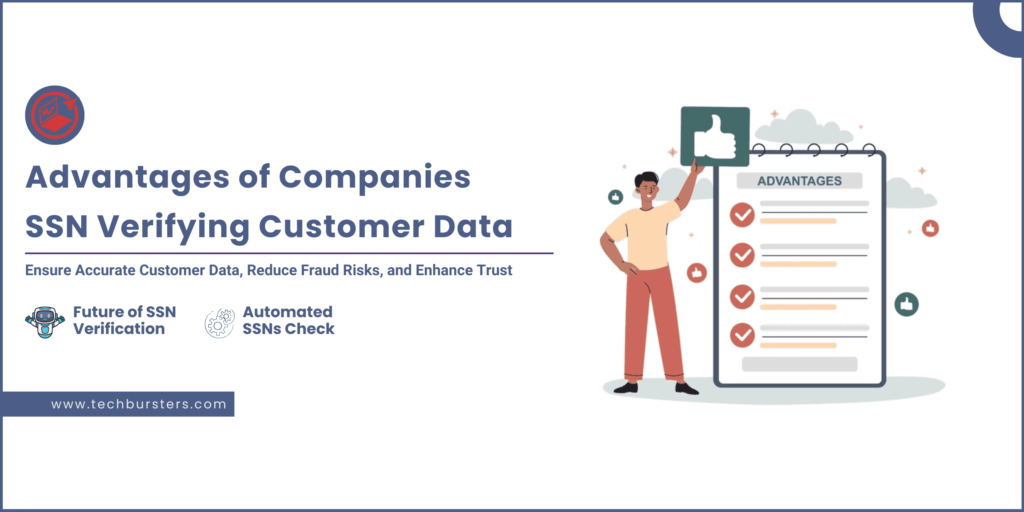
In a world where online payments and remote-based onboarding are the new way of doing things, identity verification has become an essential measure in curbing fraud and misuse of identity. Verification of Social Security Number (SSN) now has become a key element of compliance processes in all industries, particularly the financial sector, insurance, lending, education and employment.
SSN verification is used by organizations to verify the accuracy of the information given by a person with the official records, and it minimizes the chances of synthetic identities and frauds. With the increase in cybercrime and data breach all over the world, SSN checking forms the shield of regulatory compliance and secure business practices.
What SSN Verification Means
SSN verification can be described as the procedure of verifying the Social Security number of a person to official databases to verify its accuracy and legitimacy. This is done to prove that the number is in the possession of an individual who presents it. Many companies now ssn verify customer details to ensure the SSN is valid, active, and not associated with multiple identities. It also checks the validity (whether the SSN is valid or not), its activity as well as the presence of multiple identities. In most instances, ssn checks are conducted on these details by the business to reduce risks of identity and accuracy of data.
The SSN is an influential and sensitive identifier in the United States that is connected to the employment history, taxation, and financial activity. Any mistakes and misappropriation might have a long term impact not only to the individuals but also to businesses that do not carry out proper verification checks.
The use of SSN Verification by organizations
Companies use SSN checking to avoid identity fraud, major their regulatory provisions, and secure their systems against fraud accounts. It is utilized by financial institutions to verify the identity of new clients before they are able to give loans, access bank accounts or facilitate high value transactions. Verifying the SSN is used by the employers during the hiring process to, firstly, obtain the authenticity of the candidates and, secondly, to eliminate the risks of a fake background check.
Government agencies and insurance companies also rely on proper verification of SSN so as to ensure that there is legal access to benefits and services. Having many sectors that rely on SSN-based validation, the process has turned into an indispensable process of risk management.
The SSN Verification and its Indicative Role in Fraud Prevention
Identity fraud has become one of the most elaborate menaces of the digital economy. There is a tendency where criminals will fabricate synthetic identities by combining both real SSNs and fake name or fictitious name and personal information. Such fake accounts are capable of overcoming these weak authentication systems and obtain loans, credit cards, or online services.
The companies which do not check SSNs properly can facilitate financial crimes or money laundering as well as tax evasion. Authentication of identity data at the initial stages helps organizations to identify discrepancies and red flag suspicious profiles before they cause losses or breaches of regulations.
The Use of SSN Verification in Enforcement of Regulations
Strict laws and structures that mandate customer due diligence are obligatory to companies in various fields including finance and digital services. The Know Your Customer (KYC), Anti-Money laundering (AML) and identity compliance regulations require businesses to authenticate the data presented by customers. The SSN verification assists organizations to live up to such expectations and prevent fines that come with non-conformity. By verifying customer details of companies ssn, the companies also generate a verifiable record of responsible onboarding choices. This guards them in the audit and enhances their status as regards the regulatory bodies.
The SSN Checking Process
The Identity Verification Process and SSN verification procedure depend on the industry and the tools applied. Some businesses rely on government-provided databases, while others use authorized third-party platforms. Verifying key identity details such as name, date of birth, and issuance patterns are essential steps when an individual presents their SSN.
In cases where discrepancies are found in any such area, the system indicates the data to be reviewed further. Innovative platforms are the combination of various data points and cross-referencing of historical data, publicly accessible databases, and credit files. This aids in lessening false matches and smooth identification with no unnecessary delays.
Frequently Found risks associated with Unverified SSNs
Businesses that do not conduct appropriate SSN verification allow fraudsters and artificial identities to penetrate. False identities are able to claim benefits, take credit, and misuse business resources without being noticed. This results in financial loss, breach of the compliance and tarnished reputation in the long term. The identity of regulatory bodies can also carry hefty fines to those organizations that do not comply with protocols of identity verification.
This fact of no verification may also subject the companies to dangerous partnerships and disagreements within the contract. Organizations can secure their operations and their customers by ssn checking details at the point of entry.
Digitalization and Automated SSNs Check
Technology has gone a long way to enhance the speed and accuracy of identity verification. The manual procedures of the past used to be tedious and subject to the effect of human fallibility. The process of verification of the SSN is computerized nowadays using modern online tools that deliver instant information. AI, machine learning, and secure APIs enable companies to authenticate thousands of identities instantly.
Verification trails are also stored in automated platforms thus facilitating compliance auditing. Companies that can authenticate using these systems have an enhanced capability of identifying identity discrepancies, impersonation and forgery.
Employment and Financial Services SSN Checking
Employers, through verification of SSN, ensure digital safety and prevent the hiring of wrong identities while confirming that the applicant is qualified to work. Mortgage applications, activation of bank accounts, and verification of loan requests are some of the activities that rely on SSN verification by financial institutions. Whenever there is a discrepancy in the verification process, it may indicate fraud, identity theft, or administrative mistakes.
SSN verification is also utilized by many institutions to access credit reports, evaluate risk and measure customer behavior. Financial onboarding is susceptible to fraud and regulatory lapses unless SSN validation is done correctly.
SSN Verification Ethical and Privacy Issues
Although the SSN verification increases the level of security, there is the issue of privacy. Customer data should be treated with delicacy and it should be encrypted, stored securely and access limited. Businesses are to make sure that SSNs are processed by authorized systems and personnel. Customers can be subjected to identity theft and legal issues as a result of any breach.
Ethical organisations have security and at the same time are responsible for data governance. They employ checking software that restricts exposure and does not go against privacy laws, and it is only used to serve genuine purposes.
Developing Trust with Verifiability
By checking the personal information of company ssn, companies make the environment safer to the customers and partners. Valid identity identification enhances trust in the process of onboarding and minimizes the chances of fraud. It also enhances customer experience because it reduces disputes, misuse and the accessibility of services by the honest customers. SSN verification helps to deter identity misuse in sectors with monetary dealings and ensure institutional sanity.
The Future of SSN Verification
In the given situation, SSN verification will continue to play an important role in identity management because of the constantly changing fraud techniques. Biometric information, device intelligence, and highly developed authentication tools will further streamline the process. Companies that embrace secure and automated SSN verification tools will have an easier time complying with the requirements and staying relevant in the face of new adversarial threats. Constant surveillance and dynamic verification modelling will assist organizations to keep pace with artificial identity schemes and online scams.
Final Thoughts
The need to verify SSN is not a choice of preference in a world that identity fraud is becoming more sophisticated. Companies that have implemented ssn to authenticate customer and employee data have a higher potential to control risk, ensure compliance, and safeguard their reputation. Through both high-tech checks and responsible data handling, companies will be able to build a safe workflow that will build trust and avoid being exploited by criminals.
